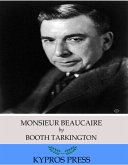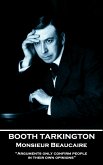Monsieur Beaucaire, a delightful novel by Booth Tarkington, encapsulates the charm and wit of early 20th-century American literature. Set against the backdrop of Edwardian society, the narrative follows the adventures of a dashing French barber in England, deftly blending comedy, romance, and social commentary. Tarkington's prose is marked by its playful irony and sharp observation, effectively illuminating the absurdities of class and identity while employing a rich narrative style that reflects both the exuberance and the skepticism of the era. Booth Tarkington, a Pulitzer Prize-winning author renowned for his keen insights into American life, drew inspiration from his midwestern upbringing and experiences within the sophisticated circles of the United States. His ability to blend humor with poignant social critique is perhaps informed by his diverse literary influences, including Mark Twain and the Realist movement of the early 1900s. Tarkington's unique perspective positions him to explore themes of illusion versus reality, which resonate throughout Monsieur Beaucaire. Monsieur Beaucaire is an engaging read for those interested in character-driven narratives that explore the complexities of identity and societal expectations. Tarkington's masterful storytelling and incisive wit make this novel a compelling exploration of human nature, inviting readers to reflect on their own perceptions of class and identity with humor and grace.
Dieser Download kann aus rechtlichen Gründen nur mit Rechnungsadresse in A, B, BG, CY, CZ, D, DK, EW, FIN, F, GR, H, IRL, I, LT, L, LR, M, NL, PL, P, R, S, SLO, SK ausgeliefert werden.









